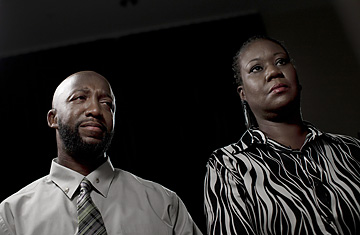
Trayvon Martins father Tracy Martin and mother Sybrina Fulton on March 25 in Sanford, Fla.
(3 of 4)
Some 20 million people live in Florida, which makes it unlikely that the increase is a statistical anomaly. In any case, the state's attorneys in Florida--who are, by definition, obligated to defend state law--have launched unusually blunt criticism against "Stand your ground" in the wake of the Martin shooting. On March 27, the Orlando Sentinel published an extraordinary op-ed by Buddy Jacobs, general counsel of the Florida Prosecuting Attorneys Association, who wrote that the legislature should reconsider the law even as FPAA members must defend it in court.
Fire, but Don't Draw
All the political dynamics swirl around the moral questions: How could a state get to the point that an armed man can shoot a defenseless teenager and not be arrested? Among the protesters gathering day by day in Sanford, that question leads to a simple answer: arrest Zimmerman immediately. Better to hold him now than let him escape. Better to question him in a cell than let him remain free.
But as pro-gun attorney Jon Gutmacher points out, the law doesn't explicitly give the cops the power to hold anyone after they have evidence that the shooter has been "attacked in any place where he or she has a right to be." Gutmacher, author of the book Florida Firearms, Law, Use and Ownership (seventh edition), says that even under "Stand your ground," gun owners who shoot an ax-wielding lunatic on their sidewalk (technically outside their "castle") must convince the authorities that they were threatened with death or bodily harm--but once they do, cops must walk away. Gutmacher went on to criticize Zimmerman and his lawyers for not releasing more information that would protect the man under a law that Gutmacher regards as a simple self-defense statute.
But 776.013 has forced authorities to accept thin defenses. Consider the 2007 case of 19-year-old William Wilkerson, who got into an argument with Jason Payne, 22, at an outdoor party in Wellington, Fla. According to state records, Payne was drunk and angry that Wilkerson was flirting with his girlfriend. A squabble ensued, and Wilkerson put three bullets into Payne, who died. Wilkerson, who claimed self-defense under "Stand your ground," was acquitted of murder, although prosecutors were able to eke out a conviction for discharging a gun from a vehicle. Wilkerson got four years.
One of the stranger elements in the legal landscape of such cases is that Florida law offers a strong incentive to shoot your gun once it's drawn. Even though the "Stand your ground" law excuses shootings with the barest of evidence, Florida punishes the crime of simply pointing a gun at someone with a mandatory minimum of three years in prison. In other words, you can point a gun and go to prison--or you can fire the gun and go free under "Stand your ground." It is highly unlikely that Martin died because Zimmerman, an aspiring police officer, knew this legal distinction. One can imagine that Zimmerman was not racist but merely hasty when he drew his Kel-Tec PF-9 pistol.
